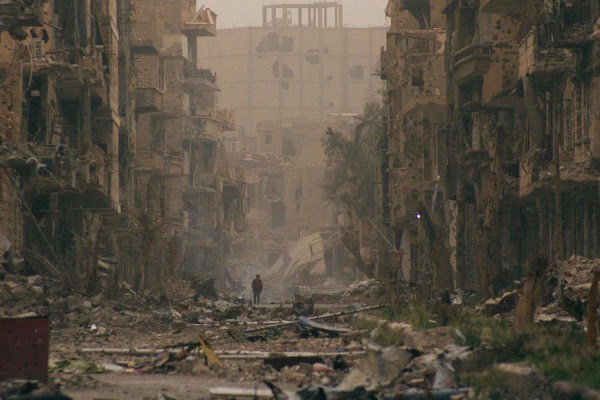
By: Barbara Slavin
Source: Voice of America
Even into a new year, the war in Syria grinds on.
The main combatants continue to pummel each other like punch drunk fighters, with no referee to make them stop.
The regime of Syrian President Bashar al-Assad controls only about 45 percent of the country but 65 percent of the population, according to Syria expert Josh Landis.
The group that calls itself the Islamic State holds a third of Syria but only a few million of its inhabitants; al-Qaida’s affiliate, the Nusra Front, occupies 5 percent of the territory and the Kurds 8 or 9 percent.
The so-called secular opposition holds the remaining 5 percent, mostly near the southern border with Jordan, but cannot operate without permission from Nusra, which allows the groups to pretend to be autonomous so they can continue to qualify for Western aid.
It’s no wonder that the Obama administration is in no hurry to train and equip a new Syrian army.
Over four years of fighting, the pro-Western opposition has failed to unite around any leader and thus has been pushed aside by Nusra and Islamic State group, which include old Iraqi Baathists masquerading as Islamic fundamentalists.
U.S. policy is aimed at flushing Islamic State fighters out of Iraq – where Washington and much of the rest of the world backs the elected government – not building up a viable alternative in Syria – where the West and Sunni Muslim states oppose the regime.
Refugee crisis
Without a strategy for Syria, the Obama administration is concentrating on mitigating the humanitarian fallout from the country’s growing fragmentation.
In an interview last week, Assistant Secretary of State for Population, Refugees, and Migration Anne Richard said the U.S. would substantially increase the number of Syrian refugees allowed to settle permanently in the U.S. from fewer than 400 in 2014 to as many as 10,000 in 2015.
While the figure is tiny given that there are 3.3 million Syrian refugees, it will account for nearly 15 percent of the total annual U.S. quota for refugee admissions of 70,000.
The decision reflects the reality that Syrian refugees are not going to be able to go home any time soon. The crisis has gone on so long that the exiles are producing a second generation that is effectively stateless – including an estimated 30,000 children born in Lebanon alone.
According to Richard, the U.N. High Commissioner for Refugees – which does the initial registering and vetting of refugees – is now referring 1,000-1,500 new applicants for resettlement to her office each month. Most are women with children, those with medical conditions and the elderly, she said, and most are likely to be accepted.
While the outpouring across Syria’s borders has begun to level out, Richard said the number of those internally displaced continues to rise as the battle lines shift among the country’s armed factions.
There are now 7.6 million people internally displaced by the fighting, including more than 200,000 in areas inaccessible to international aid, she said. More than 200,000 have died since the uprising broke out in 2011.
No easy path toward resolution
Apart from delusional jihadists, no one thinks that any side can “win” this war.
Even as Islamic State group loses momentum in the face of U.S.-led airstrikes and popular disaffection, the Assad regime is weakening, too.
According to a report by the Institute for the Study of War, the Syrian armed forces have lost half their strength and now number only about 150,000. Of the more than 200,000 Syrian dead, more than 40,000 have been soldiers.
Assad has survived because of political support from Russia and financial and military backing from Iran, which provides oil and other economic aid, military advisers from the Revolutionary Guard’s Qods Force and fighters from Lebanese Hezbollah and other Iranian allies, including Iraq.
But many of these Shi’ite Muslim fighters shifted to Iraq to combat the Islamic State group last summer. Meanwhile, the plummeting price of oil is diminishing the ability of Russia and Iran to continue to prop up the government in Damascus.
This crisis cries out for a political solution that would combine the least blood-stained elements of the Assad regime with the least objectionable members of the Syrian opposition to unite against IS and Nusra.
A Russian envoy, Deputy Foreign Minister Mikhail Bogdanov, has been making the rounds in the region, trying to promote new peace talks, but has been rebuffed by the Syrian National Council, the exile-led remnant of the Western and Persian Gulf Arab-backed opposition.
The missing element so far has been Iran.
In an interview broadcast Monday with National Public Radio, President Barack Obama said Iran could be “a very successful regional power” if it begins abiding by “international norms and international rules.”
The first step is concluding a comprehensive deal that curbs Iran’s ability to develop nuclear weapons. Then the U.S., Iran, Russia and Sunni Muslim powers should commence back channel talks about how to construct a transitional Syrian government with the widest possible support from the international community and the Syrian people.
No one is underestimating the challenge of this task. But governments that have been stoking the war in Syria for the past four years owe it to Syrians and their neighbors struggling to cope with refugees to help find a way out of conflict.
The views expressed in this article are the author’s and do not necessarily reflect those of MuslimVillage.com.



